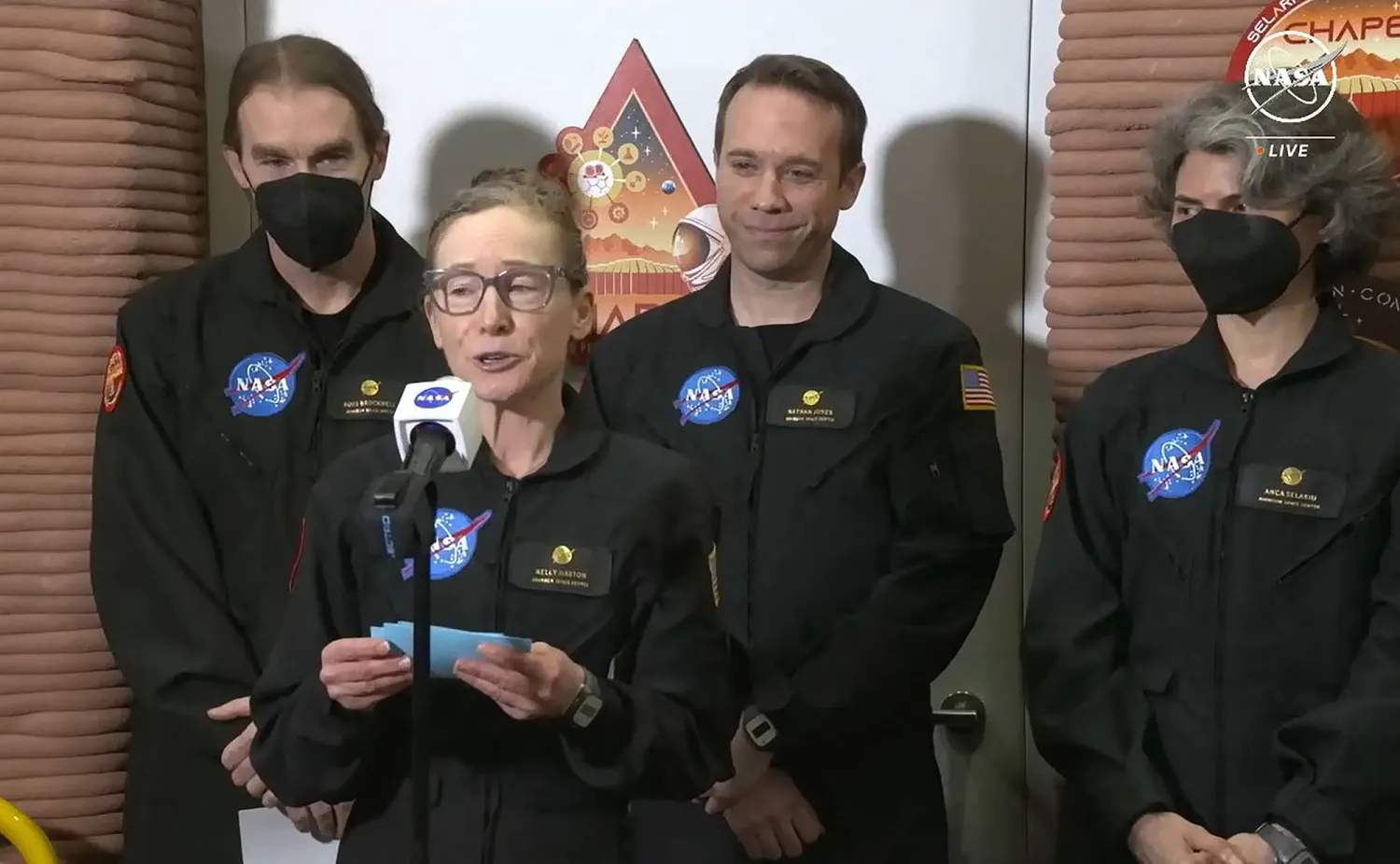The crew of a NASA mission to Mars emerged from their craft after a yearlong voyage that never left Earth.
The four volunteer crew members spent more than 12 months inside NASA's first simulated Mars environment at Johnson Space Center in Houston, coming out of the artificial alien environment Saturday around 5 p.m, The Associated Press reported.
Kelly Haston, Anca Selariu, Ross Brockwell and Nathan Jones entered the 3D-printed habitat on June 25, 2023, as the maiden crew of the space agency's Crew Health and Performance Exploration Analog project.
Haston, the mission commander, began with a simple, “Hello.”
“It’s actually just so wonderful to be able to say ‘hello’ to you all,” she said.
Jones, a physician and the mission medical officer, said their 378 days in confinement “went by quickly.”
The quartet lived and worked inside the space of 17,000 square feet (1,579 square meters) to simulate a mission to the red planet, the fourth from the sun and a frequent focus of discussion among scientists and sci-fi fans alike concerning a possible voyage taking humans beyond our moon.
The first CHAPEA crew focused on establishing possible conditions for future Mars operations through simulated spacewalks, dubbed “Marswalks,” as well as growing and harvesting vegetables to supplement their provisions and maintaining the habitat and their equipment.
They also worked through challenges a real Mars crew would be expected to experience including limited resources, isolation and delays in communication of up to 22 minutes with their home planet on the other side of the habitat's walls, NASA said.
Two additional CHAPEA missions are planned and crews will continue conducting simulated spacewalks and gathering data on factors related to physical and behavioral health and performance, NASA said.
Steve Koerner, deputy director of Johnson Space Center, said most of the first crew's experimentation focused on nutrition and how that affected their performance. The work was “crucial science as we prepare to send people on to the red planet,” he said.
“They've been separated from their families, placed on a carefully prescribed meal plan and undergone a lot of observation,” Koerner said.
“Mars is our goal,” he said, calling the project an important step in America's intent to be a leader in the global space exploration effort.
Emerging after a knock on the habitat's door by Kjell Lindgren, an astronaut and the deputy director of flight operations, the four volunteers spoke of the gratitude they had for each other and those who waited patiently outside, as well as lessons learned about a prospective manned mission to Mars and life on Earth.
Brockwell, the crew's flight engineer, said the mission showed him the importance of living sustainably for the benefit of everyone on Earth.
“I’m very grateful to have had this incredible opportunity to live for a year within the spirit of planetary adventure towards an exciting future, and I’m grateful for the chance to live the idea that we must utilize resources no faster than they can be replenished and produce waste no faster than they can be processed back into resources," Brockwell said.
“We cannot live, dream, create or explore on any significant timeframe if we don’t live these principles, but if we do, we can achieve and sustain amazing and inspiring things like exploring other worlds," he said.
Science officer Anca Selariu said she had been asked many times why there is a fixation on Mars.
“Why go to Mars? Because it’s possible,” she said. "Because space can unite and bring out the best in us. Because it’s one defining step that ‘Earthlings’ will take to light the way into the next centuries.”
Crew of NASA's Earthbound Simulated Mars Habitat Emerge after a Year

In this still image taken from a July 6, 2024, NASA TV broadcast, volunteer crew commander Kelly Haston speaks alongside crewmates (L-R) Ross Brockwell, Nathan Jones and Anca Selariu, as they exit the first simulated yearlong Mars habitat mission at Johnson Space Center in Houston, Texas. (Photo by Jose ROMERO / NASA TV / AFP)

Crew of NASA's Earthbound Simulated Mars Habitat Emerge after a Year

In this still image taken from a July 6, 2024, NASA TV broadcast, volunteer crew commander Kelly Haston speaks alongside crewmates (L-R) Ross Brockwell, Nathan Jones and Anca Selariu, as they exit the first simulated yearlong Mars habitat mission at Johnson Space Center in Houston, Texas. (Photo by Jose ROMERO / NASA TV / AFP)
لم تشترك بعد
انشئ حساباً خاصاً بك لتحصل على أخبار مخصصة لك ولتتمتع بخاصية حفظ المقالات وتتلقى نشراتنا البريدية المتنوعة







